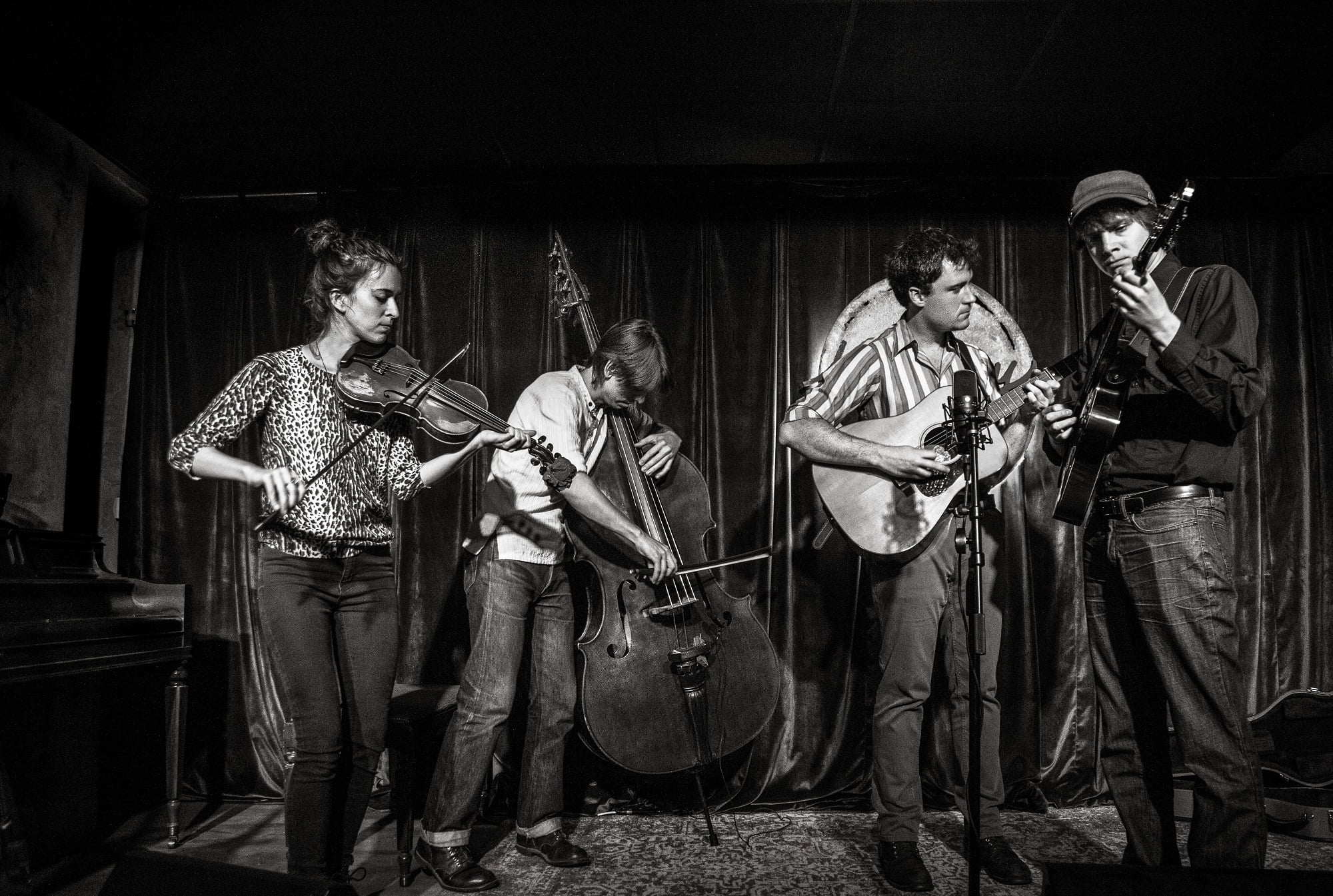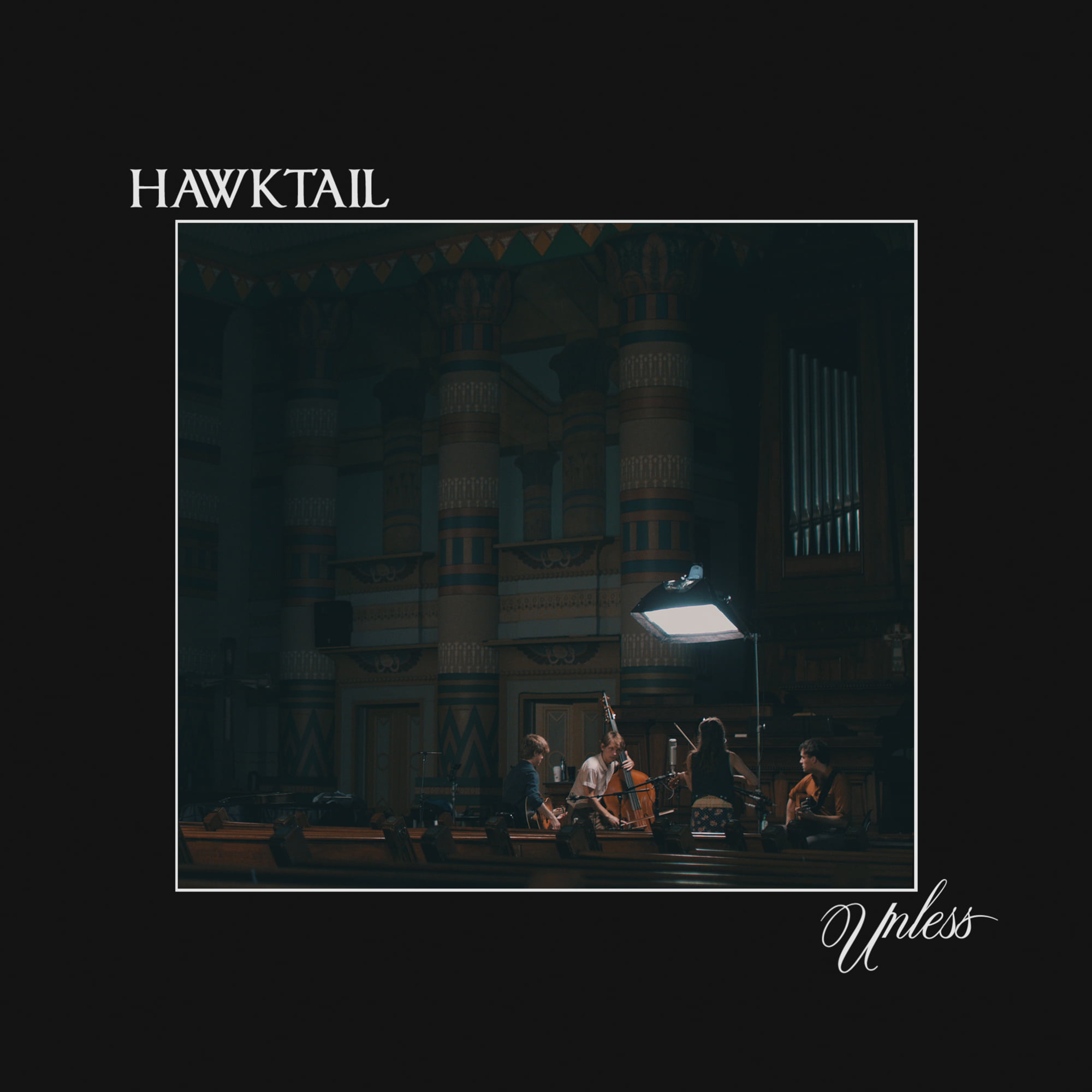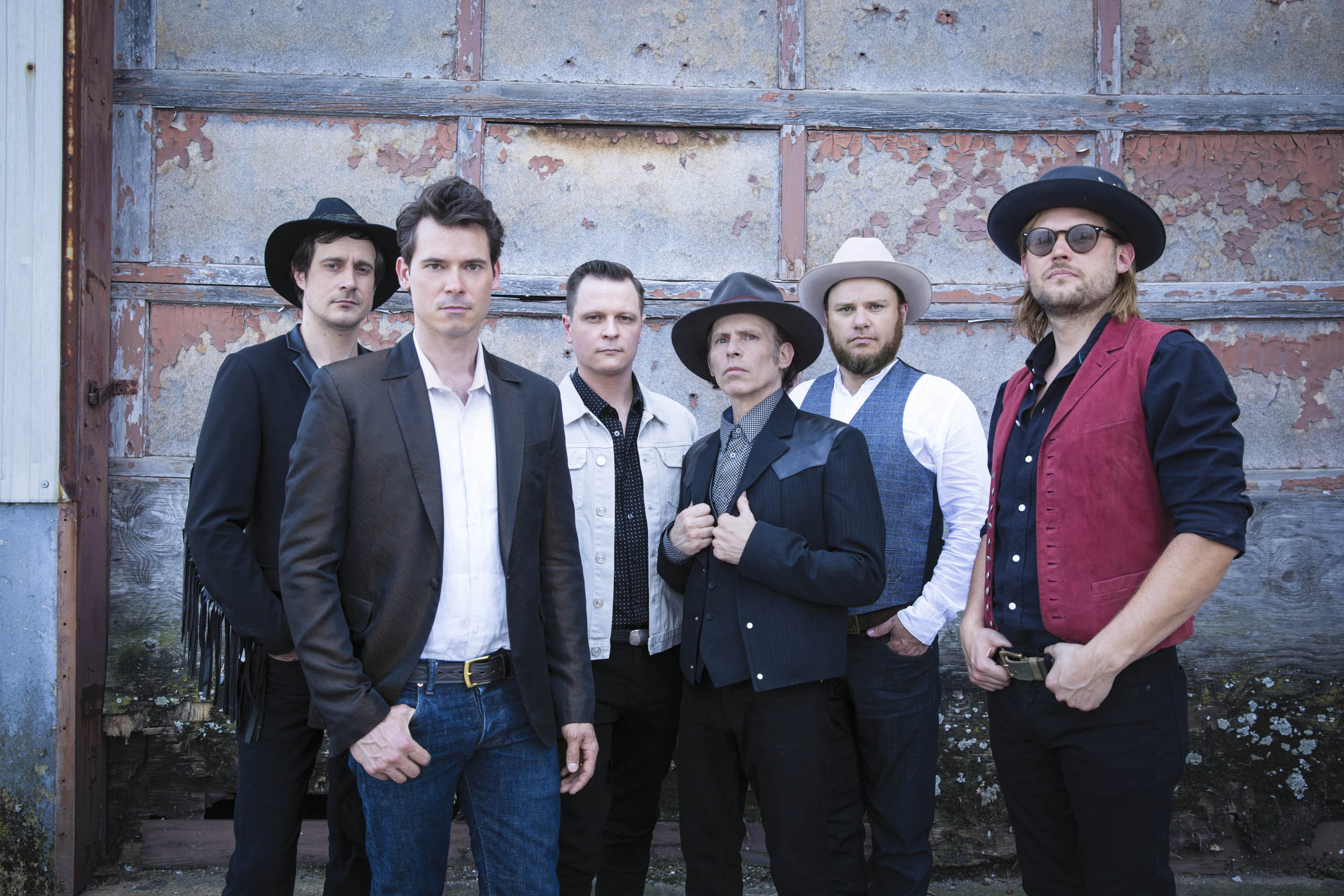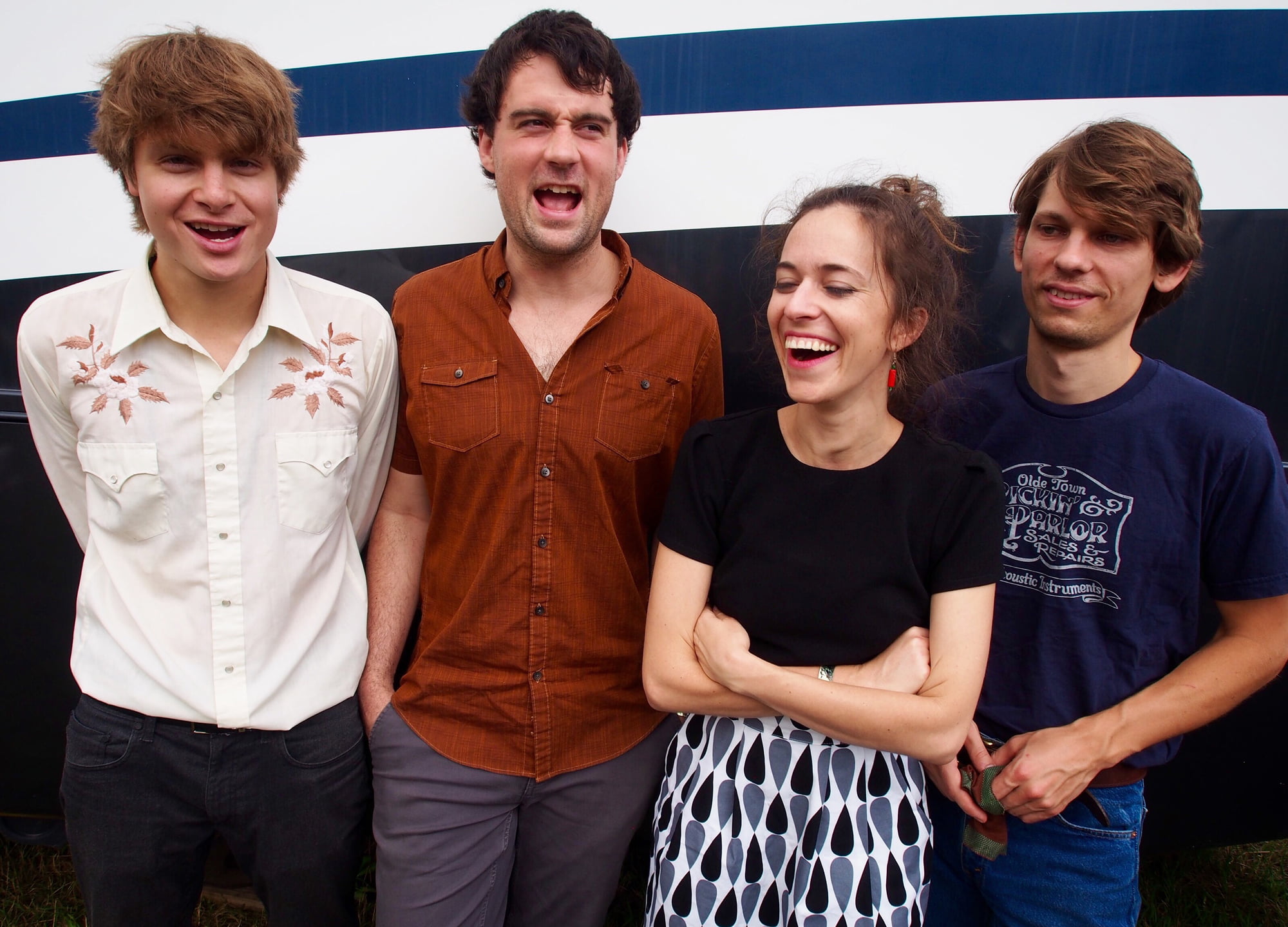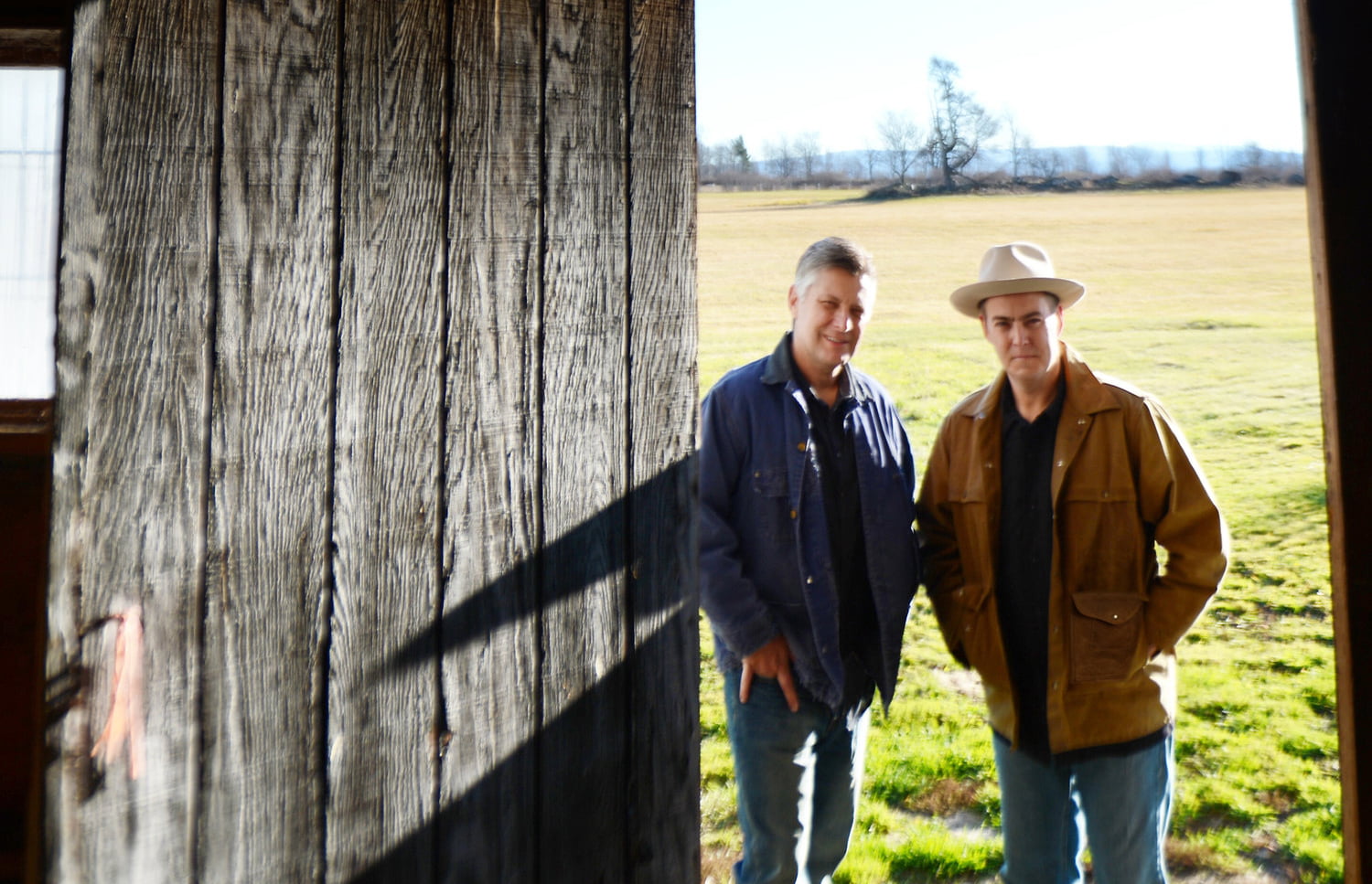Chalk it up to changes in the music business—goodness knows there are some reasons to do so—but whatever the cause, it’s clear that, at least in the roots music world, more musicians than ever are choosing to devote themselves to more than one project at a time. Case in point: Hawktail, the trio known as Haas Kowert Tice before they expanded to a quartet in conjunction with the making of their latest release, Unless. Each member has built a career out of participation in multiple, and often musically different configurations—not only in the past, but right now and for the foreseeable future—even as they’ve persisted in exploring a sound that is uniquely Hawktail’s.
That’s obviously been a challenge when those other ventures include acts as prominent as Punch Brothers (Kowert’s their bassist) and the David Rawlings Machine (fiddle by Brittany Haas), or as personal as guitarist Jordan Tice’s Horse County album of 2016. But the addition of mandolinist Dominick Leslie (Deadly Gentlemen, Missy Raines & The New Hip) is, if anything, a token of how committed the group is to that distinctive sound, and to finding a long-term, yet non-exclusive way to keep making it. And the value of that pursuit can be measured by the music on Unless, which slides effortlessly and naturally from spicy takes on traditional American fiddling to more wide-ranging tangles of sophisticated chords and melodies that are nevertheless equally memorable.
A conversation with any of Hawktail’s members would have been enjoyable, but I was especially glad to get to talk to Haas, whose powerful bow arm and fierce energy first knocked me out when I joined the Tony Trischka bluegrass band for a couple of tours around the recording and release of his Double Banjo Bluegrass Spectacular album. Getting to hear her night after night was a real treat, and I’ve been a fan ever since—and now the Americana Music Association’s on board, too, giving her an Instrumentalist Of The Year nomination just a few days ago. With all that she and her bandmates have going on, catching a Hawktail show requires some vigilance, but it’s well worth the effort.
Did you really have all of Unless cut, and then decide to chuck it when you brought Dom in?
We actually did it twice, and chucked all of that, basically; there was one song that made the cut from an earlier recording—a tune called “Britt Guit,” that’s the one on there that’s only the trio. But yeah, it was a long process, because we cared about it a lot, we wanted it to be just right. So we did it several times.
Part of it was that we were missing an element, which turned out to be Dom, and part of it was that we hadn’t gotten the tones in quite the way that we liked them. And then, just as Dom was joining the band, and we’d done some sessions with him, we did this West Coast tour in November of last year. Those were the first live shows we played as a quartet, and Paul had just gotten this recorder right before the tour, and he recorded them all. We were doing that to sort of figure things out, because the arrangements were still developing as we started playing them, but it went so well, and then we decided that some of the live versions were better than anything we got in the studio. So it was a constantly evolving process—but we’re happy with the state that it’s in now.
It’s interesting that you mention your concern about the tones, because they’re really consistent between the live and studio cuts.
Yeah, that was amazing. We’re kind of baffled by it.
You mentioned being really committed to this project, even though y’all are involved in other stuff. What is that makes Hawktail bubble up to or near the top of your priority list? Because I’m sure there are more things that you could do than things that you actually do.
Well, for me, it kind of came about because of our long musical friendship. At the time that we started being a trio officially, we’d been friends for maybe six years or so, who just played for fun when we had time. But then I was getting a little bit more free because Crooked Still was slowing down, so I thought, I need something new to fill the time. And I’d always loved making music with these guys. So that was the impetus of it for me. But the longer that it goes on, and the deeper we get into it, the more it’s just a really cool creative outlet, and one that I learn a lot from, because it pushes me in different ways than the other projects.
The songs on Unless are credited to Hawktail, not individual members. It seems to me that’s something that’s getting more traction in our corner of the world, crediting everyone in the band for a tune. More and more folks are choosing to take collective credit in a way that underlines the seamlessness between writing and arranging. Is that the way you guys work? Does someone bring in an idea and then you work it up, or are people bringing in whole pieces and then you all are going from there? Is it one continuous thing or are there clear lines of separation?
I think it’s more continuous, and that’s the way we like it to be. It evolved over time. Of all the material that we have, some of it has been more where somebody has a distinct idea and brings it to the band, and then we arrange it together. But ultimately, the arrangements do a lot, because that’s how we figure out how to be ourselves on the piece. So yeah, it’s really collaborative, and now having Dom in it, and using the stuff we’ve written already but incorporating him into it is very much a process that we’re all figuring out together. It’s pretty cool—it’s very collaborative, very democratic.
It sounds like you guys are having fun. I wonder how you would describe for our readers…when I listen to the record, and when I listen to the other record, for that matter, there are passages where I think, that’s a fiddle tune there—it sounds like a fiddle tune, it has rhythms like a fiddle tune, it might have more parts than a usual fiddle tune, but that’s still kind of where it comes from. However, other stuff is much more moody and lyrical. Where does that come from?
Good question! I often don’t even know—like I’m definitely more responsible for the fiddle-tuney things. Jordan and Paul, their musical relationship goes back 10 years—as it does for all of us, really, even including Dom, just through the music scene—but they were writing music together through all that, where they realized that they were into a lot of the same music, like Edgar Meyer, Béla Fleck, Väsen, and classical music as well. They’ve got this way of writing together, from being inspired by all these same things, and talking about them, and incorporating them with the cool harmonic ideas that they both have.
The title track, “Unless,” is really inspired by Väsen and that Swedish music and its harmonies, and the amazing stuff that their guitar player does, the lines that just cascade through it, leading you to all these new places and the chords. And then the tune “Randy,” that was a guitar tune primarily, that was kind of Jordan’s guitar playing and harmonic conceptions. And then there’s things that blend that, or at least try to, that have little bits of a fiddle tune here and there, but then get a little more expansive around it.
It seems like it’s a way of writing within a single tune, similar to what a lot of the jam bands do in a set, which is to go from this texture to that, and kind of fiddle around back and forth, and have these really significant changes in musical feel, going from one song to another. And you guys are sort of doing that within a single tune sometimes. I remember flying home from Joe Val one time with Critter, and he played me roughs of what became “Blind Leaving the Blind.” Some of it was super-composed, and then they had much more improvisational sections, too. Is that what you guys are doing—you have some parts in tunes where you really know what the other folks are doing every time you play the piece?
Yeah, totally. We do have a bunch of that. And that was also kind of new to me, to be that specific about things. But it’s cool what that opens up, in terms of musical gestures that can really get you somewhere. And just knowing what everyone else is going to be doing—that actually opens things up. I think in my mind I used to think that was confining, like you have to play a scale at this time. But then to feel the effect that it has, the power you can get from that, is great.
Is it a big challenge for you guys to work out the Hawktail stuff with everything else that you’ve got going on?
It has been, but I feel that, as we’re all growing up and kind of figuring out what our lives are, and how we want to balance things, it gets a little bit easier. Like, OK, we now know—we’ve learned the timeline of how far ahead we have to think, and how careful we have to be about saving time for this band that we all love so much. We don’t want to let ourselves get too busy with other things. We’re getting there—we learn every day, you know! Being out on the road, and just doing it and figuring out each step of working with a booking agent, or of not having a manager, and what that means you have to do. It’s been a learning curve, and we’re grateful to everybody who’s helped us along the way. And the fact that we’re such close friends, I think, helps, because we can be like, you dropped the ball on that! We’re all coming into our roles more and more as we go.
It seems more difficult in the short run, but maybe more sustainable in the long run—it leads to a more enjoyable life and career as a musician, to be able to do different things, scratch different musical itches, and spend time with different people.
Yeah, I think we’re realizing that, too. We’ve known each other for such a long time already that this musical bond that we have, and our similar paths through life and our careers means that this is not going to go anywhere; we’re gonna always be friends and we’re always going to want to keep collaborating. So we don’t have to hit it so hard at this exact second—we have to just remember that it’s this beautiful thing that can sustain and exist for the rest of our lives, if we’re good to each other and keep being excited about creating together.
So there’s more Hawktail to come?
Definitely!
Photo credit: Tilt at Windmills Photography
